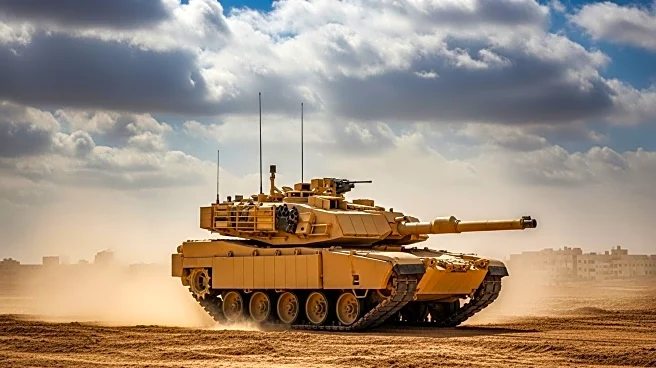What is the story about?
What's Happening?
The Israeli Defense Forces (IDF) are preparing for a significant ground maneuver in Gaza City as part of ongoing efforts to combat the Hamas terrorist organization. This preparation follows approximately ten days of airstrikes targeting towers and high-rise buildings in the area. The decision to focus on Gaza City was made by the Israeli security cabinet, which considered various strategic options before opting to capture and exercise operational control in the city. Gaza City is seen as a symbolic 'capital' of the Gaza Strip, housing key governance institutions and serving as a 'center of gravity' for Hamas operations. The city is also the location of Izz al-Din Haddad, a prominent Hamas military leader. The IDF faces numerous challenges, including the presence of 600,000 to 800,000 civilians in the city, which complicates military operations. The IDF aims to move the civilian population to enable more effective military action while adhering to strict operational constraints.
Why It's Important?
The IDF's planned operation in Gaza City is a critical component of Israel's broader strategy to weaken Hamas and secure the release of hostages held in the region. The operation's success could significantly impact the balance of power in the ongoing conflict, potentially leading to a reduction in hostilities and a shift in regional dynamics. The presence of a large civilian population poses ethical and operational challenges, as the IDF must balance military objectives with humanitarian considerations. The outcome of this operation could influence international perceptions of the conflict and affect Israel's diplomatic relations. Additionally, the operation's success or failure could have implications for future military strategies and the stability of the region.
What's Next?
The IDF is preparing for Operation Gideon Chariots B, which involves mobilizing reserve units and concentrating forces around Gaza City. The operation aims to cut off Gaza City from the south by seizing the Netzarim Corridor, thereby controlling civilian movement and preventing the transfer of hostages and terrorists. The IDF plans to impose a siege on Hamas fighters, cutting off essential supplies like water to force a surrender. The success of these efforts will depend on the IDF's ability to execute the operation efficiently while minimizing risks to both military personnel and hostages. The international community will likely monitor the situation closely, and the operation's outcome could influence future diplomatic and military engagements in the region.
Beyond the Headlines
The operation in Gaza City raises significant ethical and legal questions, particularly regarding the treatment of civilians and the use of military force in densely populated areas. The IDF's strategy to move civilians and impose a siege on Hamas fighters must comply with international laws of armed conflict. The operation's success could lead to a reevaluation of military tactics in urban warfare and influence future conflict resolution strategies. Additionally, the humanitarian impact on Gaza's civilian population could have long-term implications for regional stability and peace efforts.















